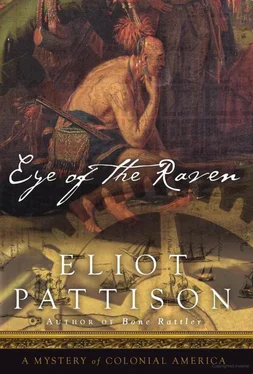Eliot Pattison - Eye of the Raven
Здесь есть возможность читать онлайн «Eliot Pattison - Eye of the Raven» весь текст электронной книги совершенно бесплатно (целиком полную версию без сокращений). В некоторых случаях можно слушать аудио, скачать через торрент в формате fb2 и присутствует краткое содержание. Год выпуска: 2010, ISBN: 2010, Издательство: Counterpoint Press, Жанр: Исторический детектив, на английском языке. Описание произведения, (предисловие) а так же отзывы посетителей доступны на портале библиотеки ЛибКат.
- Название:Eye of the Raven
- Автор:
- Издательство:Counterpoint Press
- Жанр:
- Год:2010
- ISBN:9781582437019
- Рейтинг книги:5 / 5. Голосов: 1
-
Избранное:Добавить в избранное
- Отзывы:
-
Ваша оценка:
- 100
- 1
- 2
- 3
- 4
- 5
Eye of the Raven: краткое содержание, описание и аннотация
Предлагаем к чтению аннотацию, описание, краткое содержание или предисловие (зависит от того, что написал сам автор книги «Eye of the Raven»). Если вы не нашли необходимую информацию о книге — напишите в комментариях, мы постараемся отыскать её.
Eye of the Raven — читать онлайн бесплатно полную книгу (весь текст) целиком
Ниже представлен текст книги, разбитый по страницам. Система сохранения места последней прочитанной страницы, позволяет с удобством читать онлайн бесплатно книгу «Eye of the Raven», без необходимости каждый раз заново искать на чём Вы остановились. Поставьте закладку, и сможете в любой момент перейти на страницу, на которой закончили чтение.
Интервал:
Закладка:
"Me?" Macklin laughed. "I am busy tending to our own small flock. The Iroquois Confederation runs this town, runs the region. It is for all intentions their southern capital. The Conoys, Conestogas, Delawares, Shawnee, Nanticokes, and the others all are subject to the Grand Council of the Iroquois, represented by the chiefs who reside in the longhouse villages nearby."
"You make it sound as though the Iroquois have an empire, with subject states," Hadley said between mouthfuls of shad and spring greens.
"But they do, boy. Many an Indian village along the river was bathed in blood in the last century until the tribes pressed for peace with the Iroquois League. The local tribes can run their local affairs, but may not meddle in relations with other nations, European or otherwise. No treaty concerning the realm from the Saint Lawrence to the Ohio country gets signed without the approval of the Grand Council and the marks of its leading chiefs. Several passed through just last week to join the new treaty negotiations."
"Old Belt," Duncan offered. "Long Wolf."
The German slowly nodded, studying his guests with new interest. "You are involved in matters of state?"
"Did the chief named Skanawati ever put his mark on such treaties?" Duncan ventured, with a worried glance at Conawago. His old friend, who had remained taciturn for the entire meal, seemed to be sinking lower and lower. His thoughts were secret, his mood growing morose. Something Duncan did not understand had come between them. It had started with Skanawati's confession but had been strangely magnified by his near drowning in the river.
"I daresay no treaty would ever be signed without his approval," Moses explained. "He may not sit at the first place, whose seat is always left empty in honor of long-dead Dekanawidah, our league's founder, but his position would be no lower than fifth of the fifty great chiefs who sit on the council." Duncan listened carefully.
"The fifth seat, and the most important in this region," Moses continued. "I was born in Onondaga, the capital of the Iroquois League," he added. "And even though he may be fifth, there is no other chief like Skanawati."
Duncan glanced at Conawago, who still appeared lost in other, darker thoughts.
"The chiefs of our council are called peace chiefs," Moses continued in his rich, careful voice. Not for the first time Duncan gave silent thanks to the missionaries who had for decades been teaching the Indians to speak English. "They are the wise ones that guide the tribe, in consultation with the wives and mothers. It is no good for a people to be governed by those who feel the heat of war, so the supreme chiefs like Old Belt never lead war parties, seldom even lift a battle ax. Except for one. For as far as memory serves, only Skanawati has the honor of being both a war chief and a peace chief, for his skills are needed in both realms."
Conawago abruptly rose and left the table.
Hadley restarted the conversation as new planks of shad were passed around the table. "Do you sometimes join with the mission on the hill?" the Virginian asked the Moravians. The words were slow to register in Duncan's consciousness, for he was watching his friend disappear around the corner of the Germans' cowshed.
"Mission?" Reverend Macklin asked.
"I believe there is a Jesuit compound above the town, is there not?" Hadley asked.
It was the Moravians' turn to be struck dumb. The Indians pushed their food about on their plates, glancing uneasily at their spiritual leader.
"There is no mission," Reverend Macklin corrected in a tight voice. "There is no Jesuit. There is a tormented soul whose deliverance we pray for daily." With that the German rose and directed the children to begin clearing the table. The other adults, seeming eager for an excuse to leave now, quickly joined in. Only Moses, sitting across from Duncan, lingered.
"But Rideaux was a Jesuit," Duncan said to the Onondaga, "he was a missionary."
The Iroquois nodded his head. "Though the Jesuits were aligned with the French, my people allowed them to have a mission in our country, so long as they did not seek to assist their army or their king. I was there when it happened," he added. The Onondaga's wife, a handsome middle-aged woman in a red dress decorated with quillwork, appeared and settled on the bench beside him.
"When what happened?"
"When the frock was ripped from his back," Moses replied. "They even made him surrender his crucifix. We thought he would kill himself." The Indian's wife nodded sadly.
"Why would they do such a thing to him?"
Moses' face darkened. The question seemed to torment him. His wife spoke a low, quick sentence in their native tongue. Her husband nodded. "Because he loved his flock too much."
Hadley, who had been helping the children, sat down beside Duncan. Van Grut had retreated to a bench by the shed, working with his sketch pad.
"You mean," Duncan ventured after a long moment, "he became closer to the Iroquois than to his church."
"A clock. He lost his black robe over a clock."
Hadley's head shot up. Duncan leaned closer.
"I was in the mission as a boy," Moses explained. "They taught me my first writing, taught us French but also English, so as not to alarm the English who sometimes visited. There was an old church building that was not used by us, a small chapel with an altar and a room at the back where one of the aged Black Robes, who had been in these lands for over fifty years, had taken up residence. He had a clock from France that rang every quarter hour. He put it in that old chapel on the altar with a cross over it. It was a trick the Black Robes used in the last century when they first went among the Hurons and other northern tribes. He still had the old ways in his blood, would sometimes treat the Indians who had not been baptized like dumb animals. Clocks were magic, they were sorcery, they were beyond the comprehension of the tribes. That clock proved the power of the European God. I remember being taken into that chapel by my uncle when I was no higher than his waist. Many of our old people would not go to the rituals of the Black Robes, but they would sit for hours in front of that clock, and whenever it rang they would exclaim in Christian words taught to them by that old priest. It became a god to them. My uncle told me a little sacred man lived in that box, who spoke to the Europeans at night. The Indians would leave him offerings, bits of fur and feathers, little carvings, in front of it. Every time it rang my uncle cried out `Hallelujah! Hallelujah!'
"Rideaux loved our people like no others among the Jesuits, began learning our language as soon as he arrived, soon was more fluent in it, in all our dialects, than any of the other Black Robes. He would sit up all night with our sick, wouldn't stop our medicine men from doing their work like the other Jesuits did, even tried to learn Indian medicine." Moses' wife spoke again into his ear. She clearly understood the English but was not comfortable speaking it.
"She remembers the others would try to interfere with our burials," Moses related, "try to sprinkle their holy water on them as our dying breathed their last, put rosaries in their hands when they died. But Rideaux never did. He would come to our death ceremonies but never recite the Christian words unless he was asked."
"The clock?" Duncan pressed.
"Father Rideaux spent much of his time in other camps, traveling with the tribes. He never knew about it, thought it merely a matter of the older Indians going in to pray with the priest who lived there. Then one day he tried to find the old priest. He went inside, found twenty Iroquois worshipping the clock, the priest drunk on a cot in the back. He was furious, started shouting so loud the other priests came in. He declared we Iroquois were not puppets to be played with, that worshipping machines was like worshipping false idols, that his countrymen were arrogant sinners, pretending that owning better machines made them better people. He said he would match the soul of an Iroquois to that of a Frenchman anytime. He destroyed that clock with an ax, scattered the gears all over the floor.
Читать дальшеИнтервал:
Закладка:
Похожие книги на «Eye of the Raven»
Представляем Вашему вниманию похожие книги на «Eye of the Raven» списком для выбора. Мы отобрали схожую по названию и смыслу литературу в надежде предоставить читателям больше вариантов отыскать новые, интересные, ещё непрочитанные произведения.
Обсуждение, отзывы о книге «Eye of the Raven» и просто собственные мнения читателей. Оставьте ваши комментарии, напишите, что Вы думаете о произведении, его смысле или главных героях. Укажите что конкретно понравилось, а что нет, и почему Вы так считаете.












